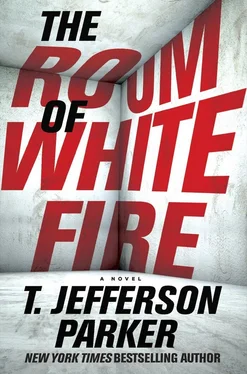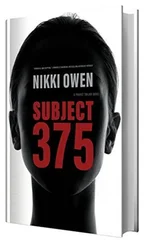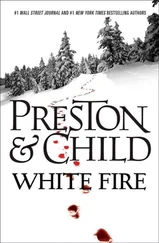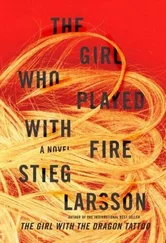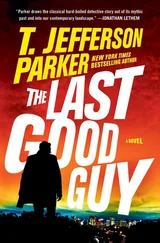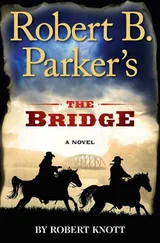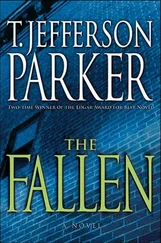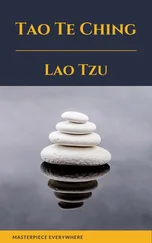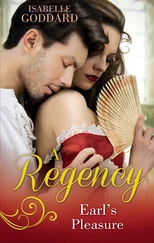“Nor you at yours. Where did you get that wonderful tie?”
“Chinatown, L.A.”
I saw a twinkle in her eye. “Do you like the restaurant?”
“Perfect, so far.”
We ordered cocktails, made small talk, watched the sidewalk pedestrians through the darkened windows. The martini hit me like a punch. I felt the last two days trying to drag me under — the bloody murder of John Vazquez, the ragged wound his death would leave in the lives of his wife and son, Briggs Spencer’s and Timothy Tritt’s gothic horrors committed in the name of security.
Paige reached across the table and set a cool hand on mine. “I felt very bad for you Saturday night. I could feel your sadness for John Vazquez and his family, and your anger. And everything we’re both feeling for Clay. And Sequoia. All from five hundred miles away. We don’t have to talk about it.”
I touched my glass to hers. Instead of murder, war, and moral injury, we talked about current events, books, sports. Careful with the politics. Then childhoods, friends, even futures. The future as What if? The future as Wouldn’t it be great to? Future happy. Future lite. I realized she was not Justine and did not resent her for it. I gave in to the energy that she brought me, let my thoughts wander and my words play. We had another cocktail, ordered dinner, and made it last. Even the silences had comfortable shapes. I couldn’t remember the last time I’d made so little effort and felt okay. We talked late, finished the wine, had a dessert liquor, and paid up.
“Let’s walk,” she said.
The April night was damp this close to the Pacific, and the electric “gas lamps” glowed in the mist. The Padres were on the road and Petco Park was dark. Spring Sundays draw out the locals, so the sidewalks were bustling. We got Jägermeisters at Bar Vie. Then a pedicab to take us past the aircraft carrier Midway, and the monstrous Unconditional Surrender statue pulsing in camera flashes.
We walked arm in arm downtown, past the library and stadium, no stated destination, no conversation. Paige stumbled slightly on a sidewalk crack and righted herself with my arm.
Then took my hand. Led me through an alley I wasn’t familiar with, then back onto the avenue, where we came to a stop in front of the swank Glorietta Lofts. I looked up at the stainless deco building rising into the mist-pricked light of the streetlamps, then at Paige, close beside me.
“Oh,” she said. “I must live here.”
“‘Neutral ground’?”
“Are you up for a nightcap?”
A ripple of thrill. “I am.”
She entered something on the keypad outside the lobby, held her thumb over a sensor, then swung the glass door open for me. I stepped past her. The lobby had a black marble floor, oak panels, gold light fixtures, and a large bronze pedestal-mounted catamaran tacking into the wind. A touch of class with a pinch of pretense.
“I could apologize for tricking you,” she said. “But my heart wouldn’t be in it.”
We stepped into the elevator. She touched her thumb to another sensor on the control panel, then pushed the brass button for floor twenty-seven. The door shut and the car lifted off and Paige turned in close to me, hands on the shawl covering her shoulders. She looked at my face but not into my eyes. I could smell her light perfume, and a trace of liquor on her breath. When the elevator braked she tilted into me.
We entered her home and lights came on. In the foyer she draped her shawl and clutch on a coat rack, added my jacket. She led me into the living room. The shutters were open and I looked out over the Embarcadero, Coronado, and across the infinite black Pacific beyond. We were above it all.
The room was large and rectangular. An industrial feel. Pendulum lights hung from the ceiling and gas flames wavered silently in a glass-faced fireplace to my right. The floor looked to be maple. The furnishings were right-angled, sober, minimally padded. One entire wall was a bookshelf with a sliding stepladder to get up high. The large floor rug on which I stood had a crazed abstract pattern not unlike my necktie. The open kitchen looked sleek and neat. Paige went in and started on drinks. I could see the back of her reflected in the big window, her shoulders bare and calves flexed as she reached into a cabinet.
“Cold vodka with a twist okay?”
“More than.”
A freezer rolled open and shut. I heard knife taps on a cutting board as she carved the twists, then the soft gurgle of liquid hitting glass. She came out with two frosted cocktail glasses topped with artful coils of lemon rind, spilling not a drop. We touched rims and drank. She turned and looked out the window so I did, too, and for a moment we stood separate but together, watching the city and the ships and the water. She took a sip, then set her glass on a coffee table and produced a remote control from between two neat stacks of magazines. Music poured into the room. She put down the remote and turned to me.
“You saved me a waltz,” I said, setting down my drink.
Bracing herself on my shoulder with one hand, she unstrapped a shoe and let it drop. Then the other. Toed them under the table.
The waltz was from The Princess Bride . Just as in our nonmusical security-office dance, the first movements were clumsy, but soon we had that waltz all to ourselves. She followed well. The night’s alcohol made me feel light. My dress shoes had good leather soles and they slid easily on the lunatic rug. I thought Paige said something and looked at her, but apparently she had not. Her gaze was level. Justine came to me in parts. Eyes but not face, voice but not words. Then drifted. To coalesce again. “Dancing with you makes me remember,” I said.
“I remember, also.”
She nodded against me.
One two three.
We glided around the funny-looking rug, took a side trip into the kitchen, around it and out, then along the face of the big window overlooking the world. A waltz is a heady dance, the play of weight and momentum. Formal and graceful. I learned by standing on Mom’s feet when I was five.
“Dan’s here right now,” she said. “And just a second ago, before we started dancing, I sensed Justine, waiting just inside you. After years have gone by, here they are. Do they talk on the other side? Don’t worry. I’m a scientist. I will not go supernatural on you. But I know they are somewhere. And that is good and okay with me.” She touched her nose to my neck and inhaled.
Beat of heart, tingle of skin. “I thought I heard you say something,” I said.
“Listen to what you don’t quite hear, Roland. It’s almost always something you don’t hear yet .”
“You pry right in.”
“I’ll shut up.”
The room spun around us: window and city and lights on the water, bookshelf and ladder, foyer and fire, the kitchen, then window and city again.
“Can I take the comb out of my hair?”
I felt her arms release and her upper body lean away, but we kept our three-quarter time. Her arms reached to their task, and her fingers worked. A dark wave fell to her shoulders. She lobbed the comb into the kitchen, where it clattered on the floor, and took my hand again.
All the songs were waltzes. Some were up-tempo and made me feel Austrian. Some were as slow as summer in Ventura, where I’d lived as a boy. Some had words and some not a one. My heart was beating strong after the first two, and my breathing was deep and good. So was hers. Five waltzes? Six?
She led me off the dance floor to the black sofa and collected our empty glasses. In the kitchen she rattled and banged, then came back with fresh glasses and twists, and the vodka bottle peeking out of a frosty stainless steel container — all balanced on a small tray. “I slung cocktails in college,” she said.
Читать дальше
